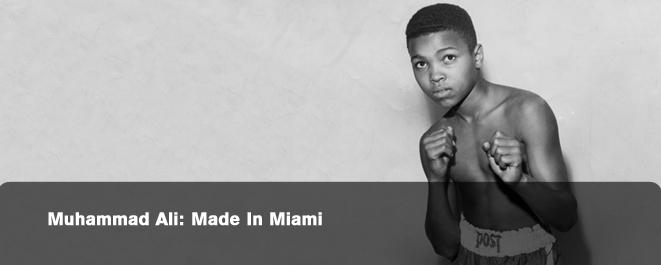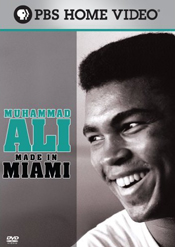 |
|
|
 |
How powerful
was Muhammad Ali? I'm not talking about his jabs in the
boxing ring, or his killer hooks. I'm talking about his
personality. I'm talking about his charisma.
"Muhammad Ali: Made in Miami" is now available on DVD.
I've never been a boxing fan, though I can admire the
technique and skill that goes into a fight. Athletes who
train in boxing are amazingly strong, because it's a
demanding and physical sport. Not only do you have to
move around, but you have to throw punches with
precision and be able to take getting punched yourself.
Cassius Clay was an incredible fighter in the ring. Fast
and smart, he could trick the best of them and lay them
out on the mat. But Clay, who would later convert to
Islam and change his name to Muhammad Ali, also won the
public over with his charisma. He was an all-around star
athlete.
This PBS special is an eye opener on the early days of
Ali's boxing career. Frankly, I've always been mixed
about Ali's public character. Growing up during the
'70s, my friends and I already knew who "The Greatest"
was. He quite simply was the greatest boxer around. It
seemed that whenever Ali was on-camera, he was boasting
and taunting. I guess his personality hadn't changed
much since the early-1960s! What is very good about this
PBS documentary is that it shows Ali in a different
light. He's a boaster and taunter, all right, but he
shows a side of him I've never seen. He's a charming and
witty person who I believe has a heart of gold. Before
his salad days in the ring, he's shown driving around
Miami talking about where the rich people live. This is
Ali (then known as Clay) being humble. He knows where
and how he grew up and is looking to change that.
Ali trained in a small gym in Miami. In the late-1950s,
racial division was running high in the United States.
By the time Ali's career started taking off with his
fight against Sonny Liston in Miami, racial conflict was
high. Ali was able to overcome much of that racism,
winning over white fans. His fight against Liston, who
was perhaps the Mike Tyson of his day, was highly
touted. Ali taunted the stockier, meaner Liston, and
could've ended his young boxing career in that fight by
being knocked out. But Ali backed up his words with his
fists and won.
It was Ali's conversion to the Nation of Islam that
transformed him into the man we became familiar with.
Many of his backers were afraid he'd alienate the white
audience he won over, as well as those in the black
community. We see Ali hanging around Malcolm X and
Elijah Muhammad, and footage of Ali siding with Elijah.
Controversy continued with Ali as he avoided being
drafted into the Vietnam War. He soon found himself with
even more admirers for his boxing skills and pacifism,
at least according to the filmmakers.
This is more of a "greatest hits" (excuse the pun)
package than an exhaustive bio on the fighter. There's
nothing wrong with this approach, because we get a good
feeling about the man himself, despite his
controversies. The pacing is quick. The show is
well-made and it's nice to hear from the people who were
there to see Ali's triumphs both in and out of the ring.
It goes to show that Ali was one of the most influencial
and charismatic athletes of the 20th century.
Bill Kallay
Special thanks to Brigid D'Arcy and Click Communications
Photos: © Artwork PBS. All rights reserved.
| DVD Quick Glimpse | |
|
|
 |
